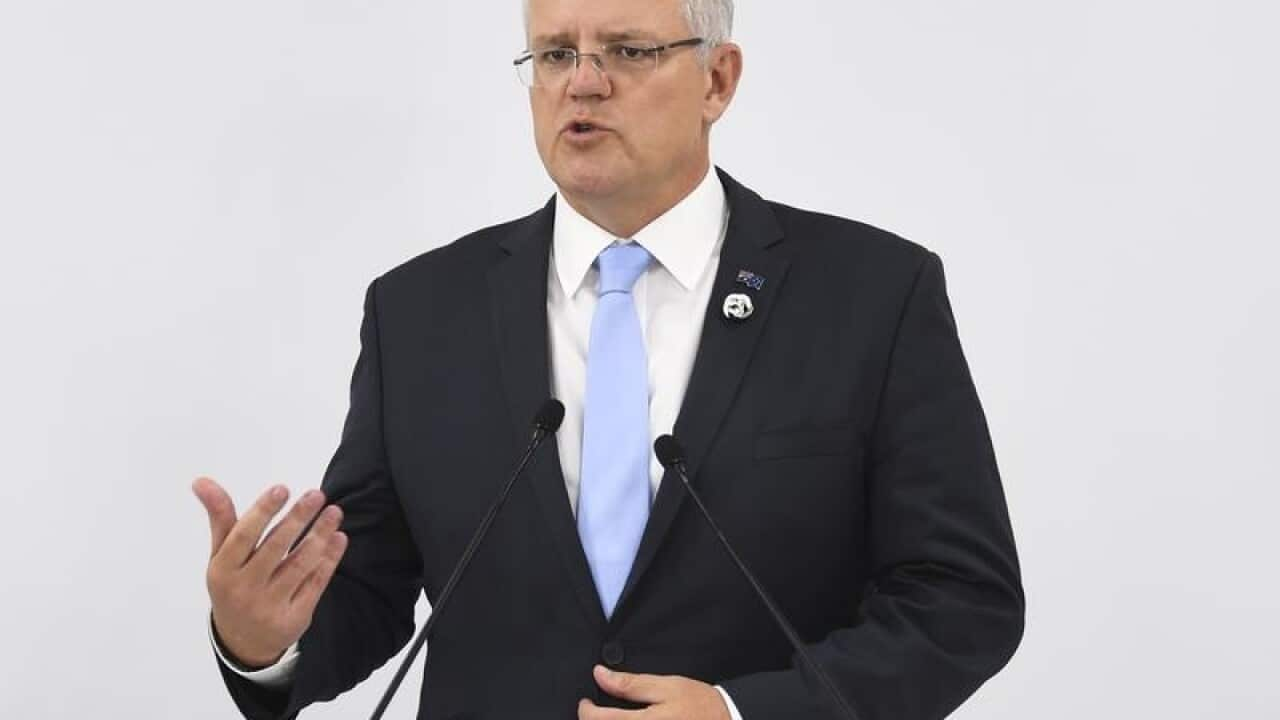In the sleepy Adelaide Hills, cheesemaker Kym Masters is cutting and wrapping his raw milk fontina cheeses and preparing them for sale.
The 45-year-old has been running his Section28 Artisan Cheeses company in Woodside for only five years but says it is long enough for customers to have developed an attachment to the brand and the names of the cheeses he produces.
“A lot of heart goes into what we do here,” he told SBS News.
The company mainly makes five different cheeses, and the name of one of them, fontina, Mr Masters may soon be forced to abandon.

Kym Masters at his cheese factory in the Adelaide Hills. Source: SBS
The European Union last month released a list of 172 food names and 236 alcohol names which contain geographical indicators that they want Australian producers banned from using as part of ongoing negotiations over a free trade deal with Australia.
They include common cheeses such as feta and gorgonzola, as well as kalamata olives and scotch whisky.
It would mean the name feta, for example, could only be used on cheeses made in Greece, and fontina and gorgonzola only on cheeses from Italy.
Australian cheesemakers aren’t happy, but if forced to adapt, some say they’ll need the government to help them rebrand some of their most famous produce.
“The loss of business will really depend on the support given to the industry more generally in terms of educating the public about the change of name. If it is expected the public are going to adapt to a new naming convention overnight that’s unrealistic,” Mr Masters said.
Support needed for new names
There are almost 60 cheese names on the list including Beauford, Bleu d'Auvergne and Grana Padano from across Europe, though mostly from Greece, Italy and France. Other common names such as Brie and Camembert are not included on the list.
The loss of business will depend on the support given to educating the public about the change of name. - Kym Masters, Cheesemaker
The changes are similar to the ones faced by Australia’s wine industry which was banned from using the name 'champagne' for products not produced in the Champagne region in France under an earlier 2010 trade agreement and had to rebrand produce as 'Australian sparkling'.
“Our customers know us well and our clients know us well ... and if we are required to change the name they will be sympathetic to it,” Mr Masters said.

Cheesemaker Kym Masters may be forced to change the name of his cheeses. Source: Facebook
“I think the best way for the federal government to provide support to the industry is an education to the consumer. So the consumer understands just because a cheese is no longer called feta it is still the same cheese they know and love and have always enjoyed on their salads.”
Mr Masters is yet to decide what new name to give his fontina but says the company will do market testing when the time comes.
Trade Minister Simon Birmingham said the EU considers the demand for name protections non-negotiable.
“It is not something that we consider usually in other trade negotiations, but the EU insists on it in all their trade negotiations,” he told SBS News.
“We have to be realistic; if we want better access to a market of more than 500 million people then we have got to work around some of their demands as we pursue our own demands,” he said.
The federal government is currently consulting with industry about the changes.
Benefits of change
Cheesemakers including Kris Lloyd from Woodside Cheese Wrights, who has been making cheese in the Adelaide Hills for two decades, are calling for an industry-wide coordinated response to find new names.
But Ms Lloyd is putting a positive spin on things.
"Perhaps we can be on the front foot before we are told we have to change names and find new names to replace those that are very common," she said.
"It’s a tricky conversation because we don’t want to lose business," she said.

Kris Lloyd has been. making cheeses in the Adelaide Hills for two decades. Source: Facebook
“It’s something I have been thinking about for a long time … I felt that perhaps it's not the right thing for us Australian cheesemakers to be doing, to be using names of regions in other countries,” Ms Lloyd said.
“How would we feel if some cheesemaker in France started calling their cheese Barossa? Or Tasmanian Heritage?”
How would we feel if some cheesemaker in France started calling their cheese Barossa? Or Tasmanian Heritage? - Kris Lloyd, Cheesemaker
Ms Lloyd admits her business was unlikely to be severely affected because they had mostly decided to use names specific to the Adelaide Hills region.
Ms Lloyd said they had mostly named their cheese things like Charlston and Edith, after nearby local towns. For others, she has got creative, with a series of cheeses named after famous artists including Monet and Picasso.
They still use some traditional names including brie and camembert.

Some of Kris Lloyd's cheeses are named after famous artists. Source: Facebook
There are concerns the naming rules won’t just affect customers in Australia, but also key export markets such as Asia, where customers with newer exposure to the cheese market may be confused by the new names.
That would potentially mean Australian producers suffer a big hit to their bottom line.
Mr Birmingham said it was too soon to talk about government support to help producers adapt.
“We don’t know if we will do a deal, if a deal will include geographic terms, we will cross that bridge when we come to it. Mindful that when the wine industry did their deal there was specific targeted assistance for rebranding at that time,” he said.
Representatives from the EU will be touring the South Australian diary region in the coming weeks to talk to producers about the changes and the Australian government will continue to consult with industry until towards the end of the year.


